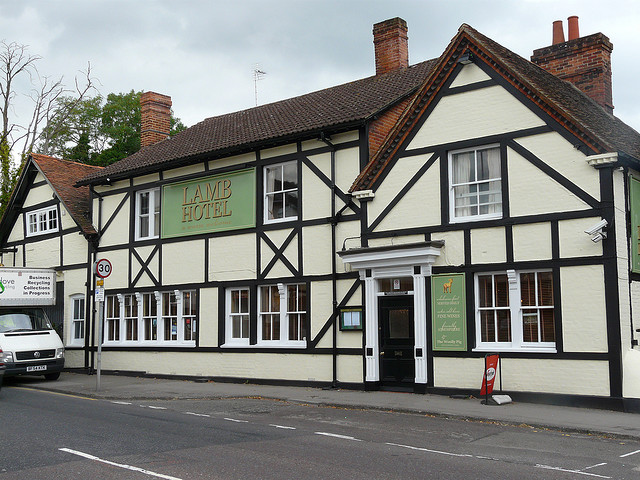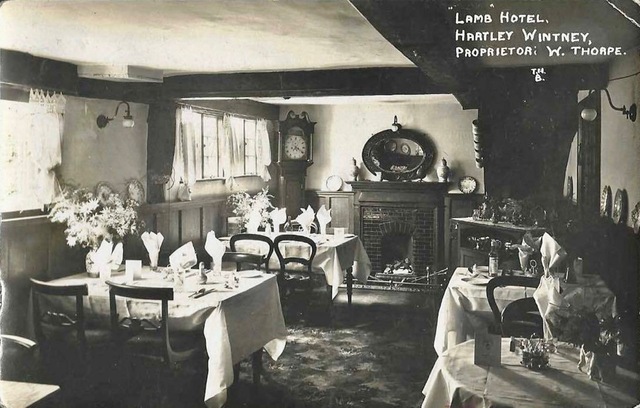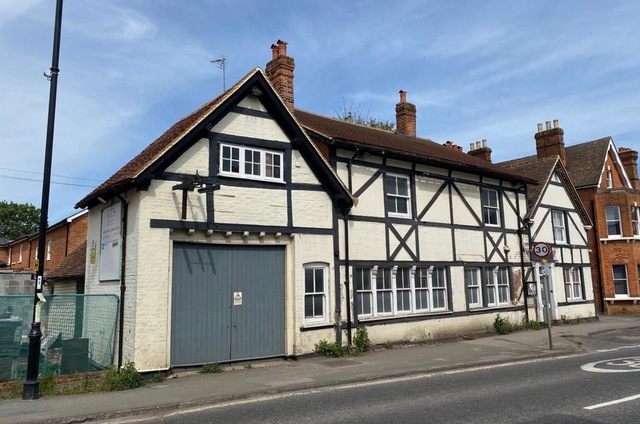» Main Index

» Search This Site

» Submit Update

» Contact Us


|
|

|
Home >
Hampshire >
Hartley Wintney > Lamb Inn
Lamb Inn

|
|
Date of photo: 2008 |
© Copyright
Mike Cattell
and
licensed for reuse under
this Creative
Commons Licence |
|
|
|
|
The Lamb Inn was situated on the High Street.
Latterly known as Hotel Zuzanka, this grade-II listed
pub closed in 2012 and is now being
converted to mixed commercial and residential use. |
|
Source: David Fisher |
|
|
|
|
|
|
Listed
building details: |
A former hotel, now being converted to
domestic use. Of late C16 or early-C17 date with C19 and C20 additions and
alterations.
MATERIALS and PLAN: the earliest, northern wing has a timber frame with
later brick infill and a tiled roof. The southern end of the east wing is of
similar early date and materials and has a carriageway at ground floor
level. The buildings are of two storeys and form an L-shaped arrangement
with a northern range, running East-West and an eastern range, running
north-south on the western side of the High Street.
EXTERIOR: the eastern front, facing the High Street is of three distinct
parts: the middle section is tallest and appears to be almost entirely a
rebuilding of the later C19, with applied timbers in imitation of framing.
It is flanked by lower, gabled wings; that to the right a C19 re-facing of
the gable end of an older wing and that to the left of similar, earlier date
and timber-framed to the first floor. The brickwork walling and infill along
the front is now colourwashed, but old photographs show that the brickwork
originally had various diaper patterns. The left, southern, gable has brick
walling to the ground floor with a square-headed carriage way at ground
floor level, flanked to its right be a four-pane sash window with cambered
head. The first floor has an exposed truss to the gable, with tie, collar
and yolk and a three-light casement set between the queen struts which
connect the tie to the collar, and support the purlins. To the right of this
the rebuilt, C19 portion has applied timber framing to its upper body,
including X-bracing and long diagonals. At ground floor left is a wide
window of five sash lights and to its right are similar windows of two
lights and one light, this last replacing a former doorway. The first floor
has two, four-light sash windows. The re-fronted gable end to right again
has a door at left with moulded surround and paired, four-light sashes to
its right. At first floor level is a further, four-light sash.
The northern flank of the building has late-C16 timber-framed walling with
four principal bays subdivided by small framing. To far right and left are
heavy arched braces which connect uprights to the wall plate. Random
fenestration consists of C19 or C20 casements. There appear to be blocked
windows at first-floor level and at least one blocked doorway to the ground
floor. Beyond this a further bay is clad in brick, but continues the
building line and ridge. At right of centre is a C19 and C20 addition at
ground-floor level with lean-to and flat roof. At right again a lower,
late-C19 service range has blank brick walling. In the yard at the rear of
the building, the south front of the northern wing has an extensive,
late-C19 addition with lean-to roof which masks the ground floor. Above this
and recessed at first-floor level, the original wall of the wing is
colourwashed, but the outline of an arched brace and an upright can be seen.
The rear of the late-C19 central section of the road front is blank at
ground floor level with two windows to the first floor. At right, the rear
of the former carriageway is now masked to its lower body by a C20 gabled
addition at ground-floor level and a C21 ground-floor brick extension with
flat roof extends to the left of this, but the timber-framing above the
carriage entrance can be seen behind this.
INTERIOR: the north wing has chamfered ceiling beams and joists with stepped
end stops to the ground floor. At first floor level are jowled posts, arched
braces and close-set uprights to partitions and external walls and wide, elm
floorboards. At the western end planted timbers have been used as supports
where the space has been opened out by later additions and a steel beam
supports a section of the ceiling joists. The later-C19, middle portion of
the street front range has been opened out internally and dividing walls
have been removed on both floors. Few original features remain in this part
of the building. The upper floor above the carriage arch has timber-framing
to both gable walls and exposed purlins. |
|
|
|
Do you have any anecdotes, historical information, updates or photos of this pub? Become a contributor by submitting them here.
You can also make email contact with other ex-customers and landlords of this pub by adding your details to this page. |
|
|
|
Other Photos |
 |
|
Picture source:
Hania
Franek |
|

|
|
Picture source:
Hania
Franek |
|
|